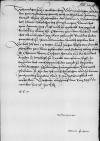List #2512
Anton FUGGER do Ioannes DANTISCUSAugsburg, 1541-11-14
| odebrano Heilsberg (Lidzbark), 1542-01-15 Rękopiśmienne podstawy źródłowe:
| ||||
Tekst + aparat krytyczny + komentarz Zwykły tekst Tekst + komentarz Tekst + aparat krytyczny
Dem hochwirdigen fursten und herren herren
Auff
Hochwirdiger furst, gnediger herr.
Ewer Furstlichen Gnaden sein mein undertanig gantz guetwillig dienst zuvvoran berayt. /
Ewer G(naden) cf.
So hab ich vor 14 tagen auff
Dattum
E(wer) F(urstlich) G(naden) undertheniger


 BCz, 1599, p. 74
BCz, 1599, p. 74